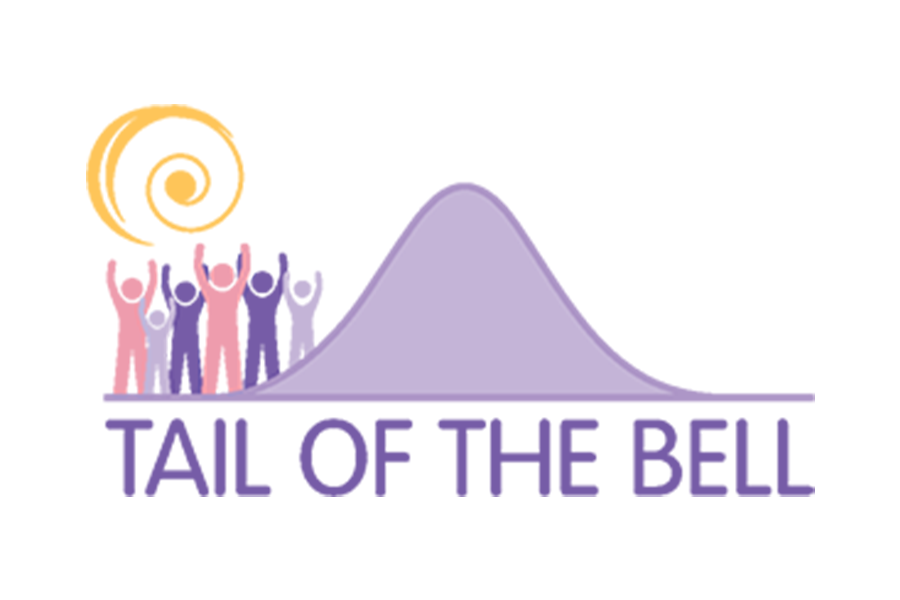
The Tail of the Bell Podcast: For Incest Survivors by Incest Survivors
What the heck? Don’t you mean Tale of the Belle, rather than Tail of the Bell? Nope! Here’s why.
The Tail of the Bell podcast features incest survivor guests whose personal histories, like mine, are at the extreme left end of a life experience’s bell curve.
So, what’s a “bell curve,” you ask? Many of us are familiar with teachers grading their students on a “curve.” Students’ scores are subdivided into five letter grades with corresponding percentages representing high, average, and low performance levels. The top 20% get As and Bs; the middle 60% get Cs; and finally, the bottom 20% get Ds and Fs. The letter grades describe a bell curve that gets its name because of the shape they make when plotted on a graph; it looks something like the Liberty Bell, a strong symbol of our freedom and independence!
Which brings us to our incest survivor–focused podcast. In addition to the grading example, the bell curve is often used to describe the occurrence of real-world human characteristics, such as a person’s height, where most measurements are concentrated around an average, there’s equal likelihood of high and low values, and very high or low observations are much rarer.
In our case, the bell curve is used to represent the distribution of life experiences. Most people have experiences that fall within a tight range around normal, such as riding a bike for the first time, graduating from high school, or getting married. However, as you move farther away from the thick center of the bell curve, you find people with less and less likely life experiences.
On the right side of the curve, you will see those who have achieved rare, ever-lasting bliss. And on the left side, you will see those who have experienced extreme tragedy and loss. It’s this last group of lone warriors who, when grouped together, become our “tail” of the bell.
Regardless of where you fall on the life experiences bell curve, it does not mean that your past life events have to dictate your future ones, nor that you will be stuck there forever. Once you receive a poor grade, you can’t go back and change it, but you can control how you respond to receiving it and how this will affect your future grades.
Will you give up? Will you push yourself forward, despite the difficulty, to move up the bell curve? If you are struggling, will you seek help from the teacher, partner with a classmate, or hire a tutor? Similarly, while you can’t change what has happened in your past, you can work now to influence your future and improve your overall spot on the life experiences bell curve. With a bit of guidance, support, and the right resources, you can make changes and find happiness.
It wasn’t until I became friends with another incest survivor that I felt truly understood. As a father-daughter incest survivor, I’d recognized that the lifelong impacts would always be there, but I had also learned to accept my limitations and honor my survivor lens. Everyday life activities, events, and milestones were all experienced through a survivor’s perspective. In some ways, I could relate to others in similar circumstances, but I always felt different—the people who knew my history listened and supported me, but they just never truly “got it.”
How different would my life have been if I had had the opportunity to connect and share my thoughts with other survivors during all the years that I walked through each day feeling different and misunderstood? It was then that I began formulating plans to give back to other survivors the gift of knowledge that, in reality, You Are Not Alone (YANA).
Tail of the Bell is the culmination of years of preparation and my way of supporting fellow incest survivor outliers. Those, like me, who lost, grieved, suffered, and still felt alone when surrounded by loved ones. Those who leaned into and committed to their own journey to healing, yet still felt a void in themselves that prevented them from fulfilling their dreams. The ones who sat shrouded in silence, shamed by society, who wished to “stand big” in the face of it all and not just be survivors but “thrivers.” Those with whom I resonate.
Join me on my Tail of the Bell podcast. Each episode focuses on a specific topic interpreted through a guest’s personal story and, where needed, further explored by experts. These are women and men warriors who have moved beyond their beginnings, “stand big,” choose happiness, and embrace their dreams.
If you seek information, insight, connection, or inspiration, listen to their stories through www.tailofthebell.com or wherever you get your podcasts.











0 comments to "The Tail of the Bell Podcast: For Incest Survivors by Incest Survivors"